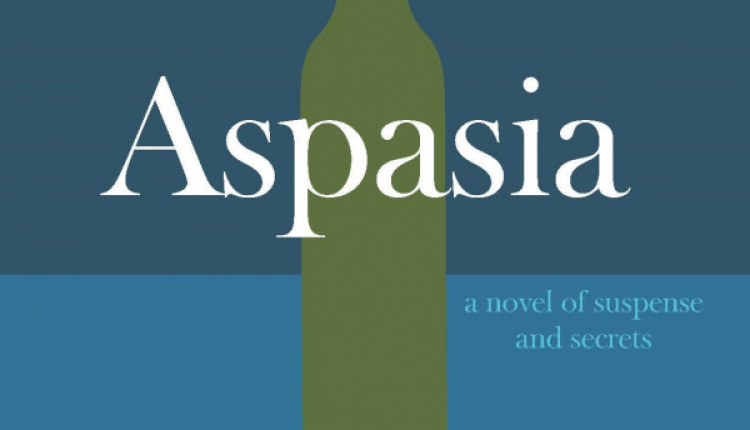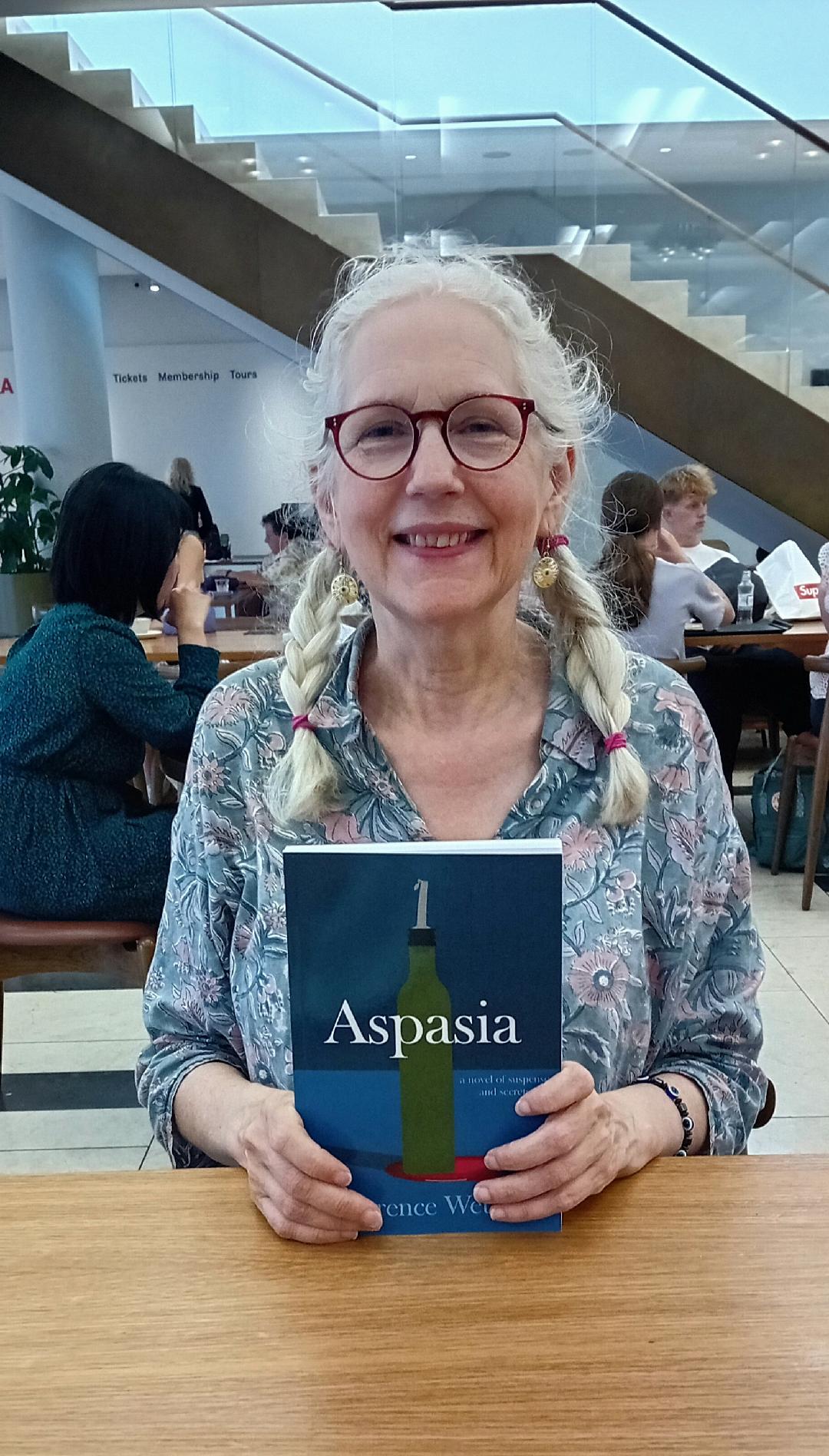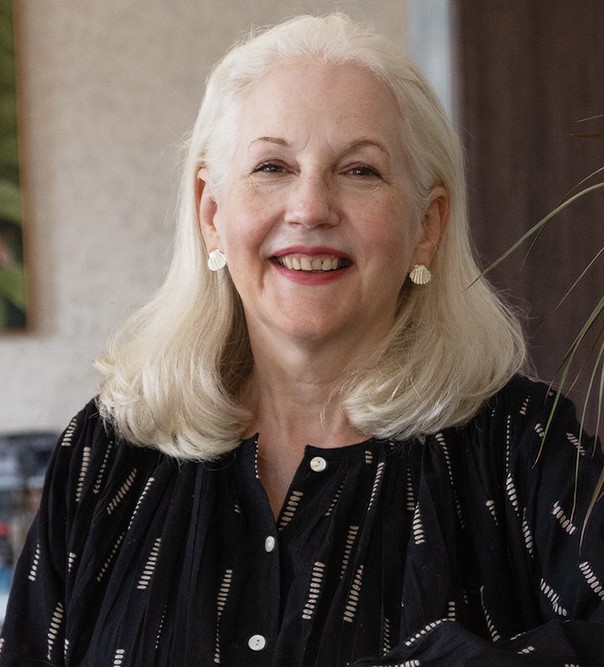Aspasia: A Suspenseful Story Of Survival & Strength
- by XpatAthens
- Tuesday, 05 August 2025

When one starts reading Aspasia, it’s not what they expect. Instead of easing into a traditional narrative, they come across something surprising; a terrible crime, one that’s hard to comprehend, unsettling even. But let me tell you: this is not a story of a devastating crime. This is a story of resilience, of strength, and of the quiet but powerful dignity that emerges when someone reclaims their life in the aftermath of tragedy.


A Journey Through Rural Greece in the 1990s
The plot takes us back to 1992, to a small village in Crete. For anyone who wasn’t old enough to remember that time — or hadn’t even been born (like me) — Aspasia offers something rare: a beautifully accurate journey back to the 90s, before smartphones, social media, or even widespread electricity in some areas. It captures the essence of a hidden Greek village, off the beaten track, untouched by modernity, where time seems to pass a little differently.
The village feels alive with the warmth and quirks of 90s Greek rural life. There’s the koutsompola neighbor — the town gossip — always watching, always whispering. There are the pappoudes, the old men who hold court at the kafeneio (the traditional Greek coffee house), exchanging stories and playing prefa. There’s the old daughter still living with her mother, her presence echoing generations of women rooted in family duty.
And, of course, there’s the "treli tou xoriou", the so-called “crazy woman of the village,” a staple figure in many small communities, someone both ostracized and oddly accepted. But as the story unfolds, we begin to question that label. Is she really mad, or is she simply someone the village never took the time to understand?
Even the stray cats seem to play their part, weaving themselves through alleyways and scenes like subtle witnesses, giving the story a lived-in realism. Wetzel gets the details right: the religious icons for protection, the communal rhythms of Greek life, the superstitions, the weathered charm of the land itself.
Katerina – The Protagonist Who Grounds the Story
Katerina narrates in the first person, and through her eyes, we experience the texture of life in this remote Cretan village. But who is she? An American expat, though not a sugarcoated version of one. She’s not some wide-eyed tourist romanticizing the Greek islands. She’s a working mother, living day to day, trying to make ends meet in a place that is as beautiful as it is challenging.
Her husband, Dimitris, is present in the book, yet far away from her, working on a cargo ship. He’s a loving husband, doing what he can to provide for their family, but his absence is palpable. His hard-earned wages are meant to help Katerina fulfill a dream: to open a frontistirio, a uniquely Greek type of private tutoring school. That one detail alone tells you how deeply this book understands Greek life.
But while Dimitris is out at sea, Katerina is left to hold everything together. And this is where Wetzel’s storytelling shines: she doesn’t romanticize her; she gives us the raw, unpolished reality of a woman who is struggling, adapting, and surviving.
The book takes us briefly through Katerina’s language struggles, and more importantly, her emotional ones: the persistent feeling of being the xeni — the foreigner. No matter how long she stays, no matter how much she gives, she knows she will always be “the outsider” in some people’s eyes. That quiet alienation is something anyone who has uprooted their life for a new country will understand.
Yet at the core of Katerina’s character is love: big, consuming, unconditional love. Her daughter is her world, and everything she does revolves around being the best mother she can be. And her empathy extends beyond people, even to the most fragile of creatures, like the tiny grey kitten she adopts despite already having five cats. That one moment says so much about her: her heart always has room for one more vulnerable soul.
Aspasia – The Little Girl with a Big Heart
And then there’s Aspasia, the real protagonist, the one who gives the book its name. She is only five years old, yet she carries a strength and light that feel far beyond her years.
Aspasia is everything a child should be: innocent, curious, and full of life. She’s a little bundle of joy, a ray of sunshine who wants to explore, to create, and to understand the world around her. She radiates the unfiltered love and boundless curiosity that define childhood at its purest.
But what makes her so compelling isn’t just her innocence, it’s her deep, instinctive kindness. Aspasia has a fierce, protective love for her cats (as any child who adores animals will understand), and she approaches the world with a heart wide open.
Above all, her bond with her mother is the emotional core of the story. She trusts Katerina completely, confides in her, and draws her sense of safety and belonging from her. Their relationship is tender and unshakable, a love so big and so beautiful that it gives the entire book its emotional heartbeat.
A Story That Dares to Go Deep
Aspasia is not just a picturesque journey into a Cretan village; it’s a book that isn’t afraid to stare into the shadows. Florence Wetzel dives into themes that are as uncomfortable as they are necessary: abuse, mental illness (including OCD), trauma, animal abuse, complicity, as well as family dysfunction and broken trust. She also explores the fragile illusion of safety — how we convince ourselves we are secure until that sense is shattered — and the moral boundaries we’re willing to cross when protecting the ones we love.
What’s striking is how these topics are handled: honestly and unapologetically. This isn’t surface-level drama but rather a deep excavation of human pain, survival, and the messy moral gray areas that often go unspoken.
And remember that when this book was first written, many of these subjects were still taboo, especially in more conservative settings like small Greek villages. To tackle them so openly shows just how ahead of her time Wetzel was. She takes the reader by the hand and leads them through discomfort, not for shock, but for truth.
Aspasia as a Modern Greek Tragedy
We could say that Aspasia carries the soul of a Greek tragedy. Florence Wetzel herself has said she drew inspiration from Sophocles’ Antigone, and it shows. The book is filled with characters caught in impossible situations, facing moral dilemmas with no clear path forward.
Even the name Aspasia holds profound weight. In Ancient Greece, Aspasia was one of the most influential women of her time, known for her intellect, resilience, and fearlessness. Giving this name to a little girl feels almost as if she draws strength directly from her namesake, embodying courage, brightness, and a quiet but unshakable will to survive.
This is where the tragedy deepens: we see tragic figures who are torn. Katerina, for instance, is completely fractured, facing unbearable dilemmas, unsure which path to take. Aspasia, too, must endure painful circumstances that no child should face, her innocence standing in heartbreaking contrast to the darkness surrounding her.
Wetzel even layers in hints of epic irony where we, as readers, often understand or sense truths that the protagonists cannot yet face, making the emotional impact even stronger.
Greek Words That Shape the Story
One of the delightful layers of Aspasia is the way Florence Wetzel sprinkles the narrative with Greek words and idioms. This roots the book deeply in its setting, making you feel like you’re truly there.
We hear words like kolokithia (literally “zucchinis,” but used as an expression when something doesn’t make sense) or períptosi (a term used for someone seen as a little crazy). These serve as cultural markers and windows into how people think, speak, and relate to one another in this community.
The result? You don’t just read about Greece; you hear it, you feel it, you pick up its quirks. For anyone who loves languages, it’s intriguing and even educational as you might find yourself learning a bit of Greek along the way.
A Final Thought
All in all, it was especially touching to see the mother-daughter relationship portrayed with such care and love. In a time when we’re constantly bombarded with despicable stories about broken families and failed parenting, it felt refreshing to see an example of someone being a truly good parent. It’s a reminder of how far one can go for family, and as Greeks, we deeply believe in protecting our own.
If there’s one line from Aspasia that stays with me, it’s this:
“There were two kinds of people in this world: those who saw something small and wanted to help it grow, and those who saw something small and wanted to exploit it for their own amusement.”
I hope that everyone who reads this book chooses to be the first type.
About The Author

About The Author

Florence Wetzel was born 1962 in Brooklyn, NY. She writes in different genres, including the memoir Sara My Sara: A Memoir of Friendship and Loss. Her novels include the thriller The Woman Who Went Overboard, the Swedish mystery The Grand Man, and Dashiki: A Cozy Mystery. She has also authored horror short stories, a book of poems and memoir essays, and co-authored jazz clarinetist Perry Robinson's autobiography. Her latest book is Aspasia: A Novel of Suspense and Secrets, published July 2025.
You can follow Florence and more of her work here or on her personal Instagram or Facebook account.
XpatAthens recently sat down with Florence to speak about her connection to Greece and her inspiration behind Aspasia - enjoy the interview here!
You can follow Florence and more of her work here or on her personal Instagram or Facebook account.
XpatAthens recently sat down with Florence to speak about her connection to Greece and her inspiration behind Aspasia - enjoy the interview here!


